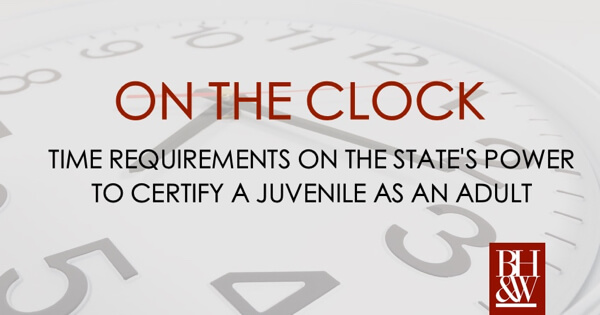
Time Requirements on the State’s Power to Certify a Juvenile as an Adult
 Texas Family Code Section 54.02 gives the juvenile court the power to transfer its exclusive jurisdiction over a juvenile case to a district court. This transfer of jurisdiction allows the State to treat a juvenile as an adult for purposes of prosecution. Section 54.02 actually lays out two different processes for transferring juvenile cases to adult court. The first process is used in cases where the juvenile is under the age of 18 at the time of certification. The second, which is laid out in Section 54.02(j), is for those cases in which a person has turned 18 prior to the filing of the case in juvenile court. The Texas Court of Criminal Appeals recently upheld the time requirements placed on the power of the State to pursue post-18 certifications in Moore v. State (Case Opinion – 2017).
Texas Family Code Section 54.02 gives the juvenile court the power to transfer its exclusive jurisdiction over a juvenile case to a district court. This transfer of jurisdiction allows the State to treat a juvenile as an adult for purposes of prosecution. Section 54.02 actually lays out two different processes for transferring juvenile cases to adult court. The first process is used in cases where the juvenile is under the age of 18 at the time of certification. The second, which is laid out in Section 54.02(j), is for those cases in which a person has turned 18 prior to the filing of the case in juvenile court. The Texas Court of Criminal Appeals recently upheld the time requirements placed on the power of the State to pursue post-18 certifications in Moore v. State (Case Opinion – 2017).
Section 54.02(j)’s Time Limits
Section 54.02(j) allows a juvenile court to transfer its jurisdiction to an appropriate district court for criminal proceedings if the person accused is 18 years of age or older at the time the petition is filed but was a juvenile at the time the offense was committed. During the transfer hearing, the State must prove by a preponderance of the evidence that “for a reason beyond the control of the State, it was not practicable to proceed in juvenile court before the 18th birthday of the person or after due diligence of the State, it was not practicable to proceed in juvenile court before the 18th birthday of the person because the State did not have probable cause to proceed in juvenile court and new evidence has been found since the 18th birthday of the person or the person could not be found.”
This section of the Family Code imposes on the prosecutors a duty to pursue cases in juvenile court whenever possible. In order to retain the power to prosecute cases after a person has aged out of the juvenile system, the State must show that the delay in prosecution was beyond its control. If it is unable to prove this, then the only choice available for a juvenile court in these situations is to dismiss the case.
The Issue in Moore v. State
In Moore, the accused was charged with Aggravated Sexual Assault of a Child. He was alleged to have committed the offense when he was 16 years of age. Due to a heavy caseload and an error in one of the police reports, the detective did not send the case to the District Attorney’s Office until after Moore had turned 18. The prosecutor filed a certification petition in the case over a year later when Moore was 19 years old. The juvenile court transferred the case to district court.
Moore pled in adult court and received 5 years’ probation on a deferred adjudication. He then appealed the case claiming that the juvenile court lacked the jurisdiction to transfer the case because the State did not prove that the delay in filing the case was beyond its control. The State first claimed that law enforcement should not be considered “the State” under Section 54.02(j). The State then argued that the court should consider whether the reasons for the delay were unconstitutional. According to this argument, if the reasons for the delay were not in violation of Moore’s constitutional rights, then the State should be allowed to proceed with the certification regardless of who was to blame for the postponement in filing charges.
The Court’s Ruling
After considering the arguments of both sides, the ruling of the Court of Appeals, and the case law presented by the parties, the Court of Criminal Appeals ruled on the case. First, the Court held that the term “the State” includes law enforcement and prosecutors collectively. The Court pointed out that the law consistently includes law enforcement in its use of this term.
The Court then dismissed the State’s notion that the requirements of Section 54.02(j) be treated like a claim of speedy trial, due process, or statute of limitations. The Court explained that the reason for the requirements in Section 54.02(j) is to limit the power of the State to prosecute a person as an adult for something that happened when he was a juvenile. In order for an exception to be made to this general rule, the State must prove that it was not at fault for the delay in prosecution.
Conclusion
The Court of Criminal Appeals’ decision in Moore is consistent with the Texas Supreme Court’s rulings in other cases involving juvenile certifications. The courts are clear that juvenile cases should be handled in juvenile court when possible. This means that detectives and prosecutors working juvenile cases must be diligent in giving these cases the proper priority so that an accused juvenile does not age out of the system before his case can be heard by the juvenile court. In any case in which prosecution is delayed until after a person’s 18th birthday, the State will be required to prove that the reason for this lag time was beyond its control. And if the State is unable to meet this requirement, then the courts will prevent further prosecution in these cases.

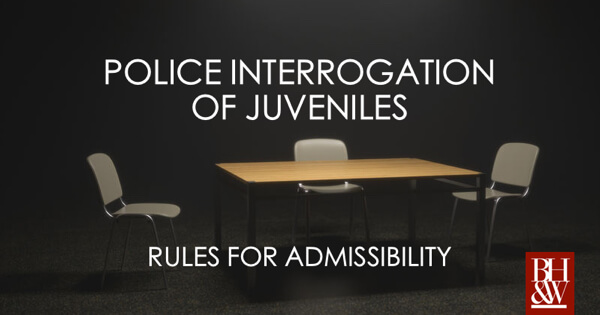
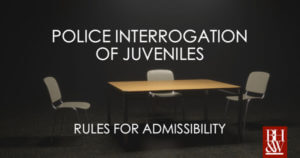 The juvenile justice system in Texas is a hybrid system which incorporates major elements of the adult criminal system, while maintaining separate rules and procedures to ensure that juveniles are not treated or labeled as criminals. In keeping with this philosophy, there are some special rules that apply when police officers take statements from juvenile suspects. This article will explain these rules and when they apply.
The juvenile justice system in Texas is a hybrid system which incorporates major elements of the adult criminal system, while maintaining separate rules and procedures to ensure that juveniles are not treated or labeled as criminals. In keeping with this philosophy, there are some special rules that apply when police officers take statements from juvenile suspects. This article will explain these rules and when they apply.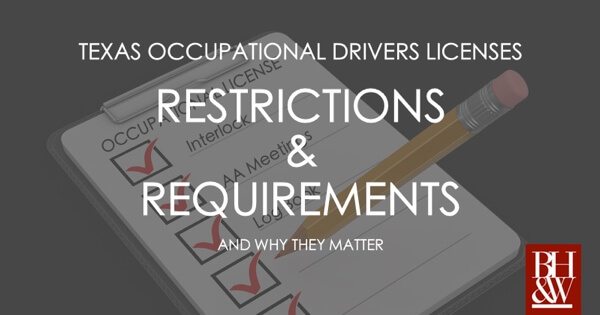
 If you’ve received an occupational license related to a DWI ALR suspension (blood or breath test refusal or failure) in Texas, the judge who granted you that license likely included several restrictions and requirements you must follow. Those requirements can be found in the order granting your occupational license. You should have that order handy because Texas Transportation Code Section 521.250 requires you to possess a certified copy of the order when you drive. In fact, it’s a criminal offense not to possess a certified copy (we’ll revisit that below.)
If you’ve received an occupational license related to a DWI ALR suspension (blood or breath test refusal or failure) in Texas, the judge who granted you that license likely included several restrictions and requirements you must follow. Those requirements can be found in the order granting your occupational license. You should have that order handy because Texas Transportation Code Section 521.250 requires you to possess a certified copy of the order when you drive. In fact, it’s a criminal offense not to possess a certified copy (we’ll revisit that below.)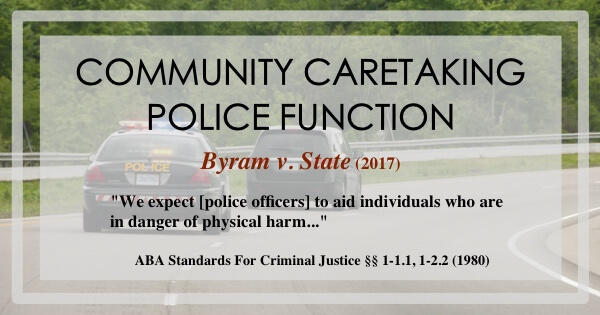
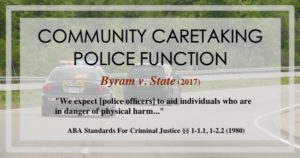 In November of 2015,
In November of 2015, 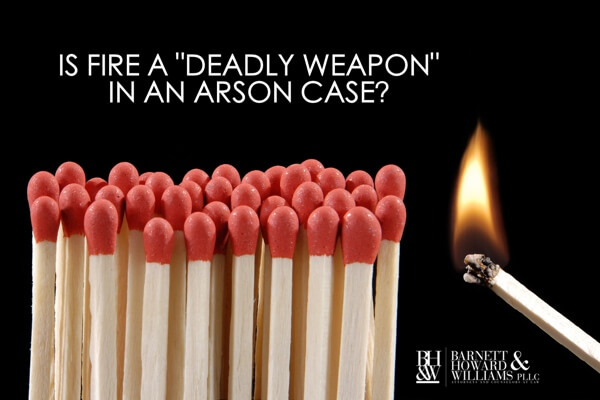
 Jeffery Pruett inherited a one-third shared interest in the family home with his two siblings after the death of their elderly parents. The adult siblings had a long history of quarreling over Pruett’s living arrangements, as he moved in and out of the residence prior to the deaths of their parents. Fed up, Pruett moved into a motor home, and was often seen by the neighbors driving around the neighborhood. Meanwhile, Pruett’s siblings listed the home for sale with the intention of dividing the proceeds equally between the three siblings.
Jeffery Pruett inherited a one-third shared interest in the family home with his two siblings after the death of their elderly parents. The adult siblings had a long history of quarreling over Pruett’s living arrangements, as he moved in and out of the residence prior to the deaths of their parents. Fed up, Pruett moved into a motor home, and was often seen by the neighbors driving around the neighborhood. Meanwhile, Pruett’s siblings listed the home for sale with the intention of dividing the proceeds equally between the three siblings.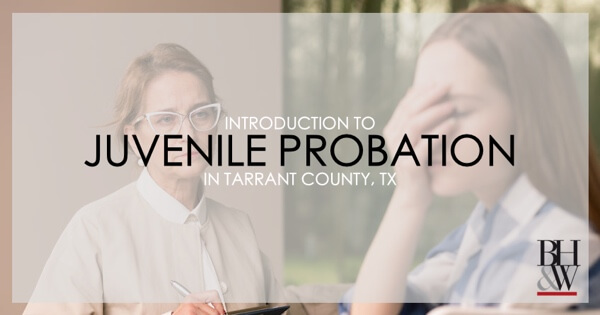
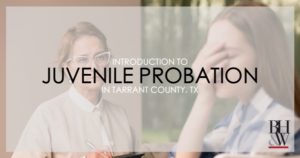 Many people have the perception that the juvenile system is simply a slap on the wrist for kids, regardless of the offense. The reason for this belief is the fact that most kids in the juvenile system get probation. But, probation is not always that simple or easy. This is an introduction to juvenile probation in Tarrant County. This article will cover the reasons behind the tendency towards probation, the length and parameters of probation and what it can include.
Many people have the perception that the juvenile system is simply a slap on the wrist for kids, regardless of the offense. The reason for this belief is the fact that most kids in the juvenile system get probation. But, probation is not always that simple or easy. This is an introduction to juvenile probation in Tarrant County. This article will cover the reasons behind the tendency towards probation, the length and parameters of probation and what it can include.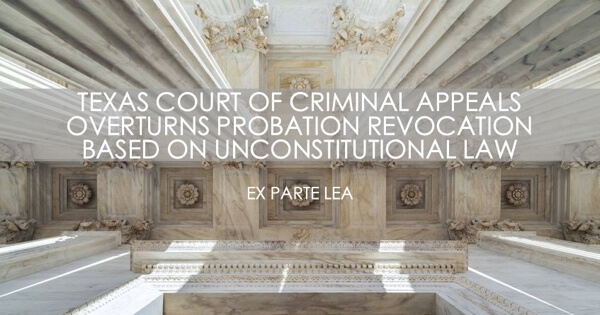
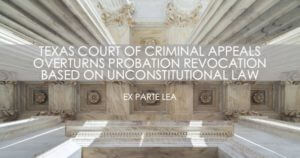 What happens when an old criminal law is rendered null and void? Do people convicted of such crimes get to walk free, or, are the convictions upheld in the interests of justice? The Texas Court of Criminal Appeals (“CCA”) filed an ex parte case (the court filed the case on its own volition) to determine whether David Lea’s punishment for his 2008 child pornography conviction should be set aside on constitutional grounds. The case was met with a dissent by Judge Yeary and the CCA reached a very interesting conclusion.
What happens when an old criminal law is rendered null and void? Do people convicted of such crimes get to walk free, or, are the convictions upheld in the interests of justice? The Texas Court of Criminal Appeals (“CCA”) filed an ex parte case (the court filed the case on its own volition) to determine whether David Lea’s punishment for his 2008 child pornography conviction should be set aside on constitutional grounds. The case was met with a dissent by Judge Yeary and the CCA reached a very interesting conclusion.
 Barnett Howard & Williams PLLC recently completed a full renovation of the historic Atelier Building (1905) in downtown Fort Worth. The Atelier Building is one of the oldest buildings in downtown Fort Worth, Texas that stills stands today. Built in 1905, the Atelier Building housed several different businesses over its 112-year history, including architects, banks, and a restaurant at one time. Located on 8th street between Houston and Throckmorton, the Atelier Building is marked by its dual terra-cotta fireplaces and marble facade.
Barnett Howard & Williams PLLC recently completed a full renovation of the historic Atelier Building (1905) in downtown Fort Worth. The Atelier Building is one of the oldest buildings in downtown Fort Worth, Texas that stills stands today. Built in 1905, the Atelier Building housed several different businesses over its 112-year history, including architects, banks, and a restaurant at one time. Located on 8th street between Houston and Throckmorton, the Atelier Building is marked by its dual terra-cotta fireplaces and marble facade.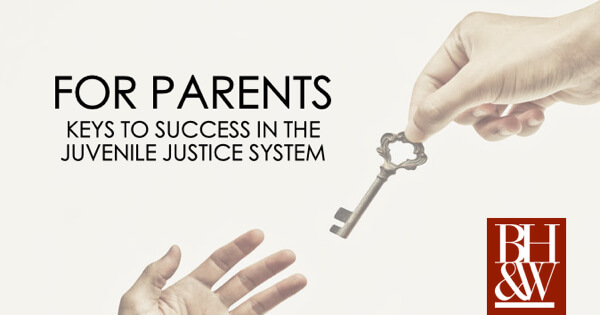
 As parents, we want the best for our children. We also want to protect our kids as much as we can. So, naturally, the first reaction for most parents when they find out that their child is being charged with a crime in the juvenile system is to do whatever they can to make the whole thing go away. However, in many cases, this is the worst thing you can do for your child. A lot of times, having a child placed on juvenile probation can be a blessing in disguise, especially if you understand the keys to success in the juvenile system.
As parents, we want the best for our children. We also want to protect our kids as much as we can. So, naturally, the first reaction for most parents when they find out that their child is being charged with a crime in the juvenile system is to do whatever they can to make the whole thing go away. However, in many cases, this is the worst thing you can do for your child. A lot of times, having a child placed on juvenile probation can be a blessing in disguise, especially if you understand the keys to success in the juvenile system.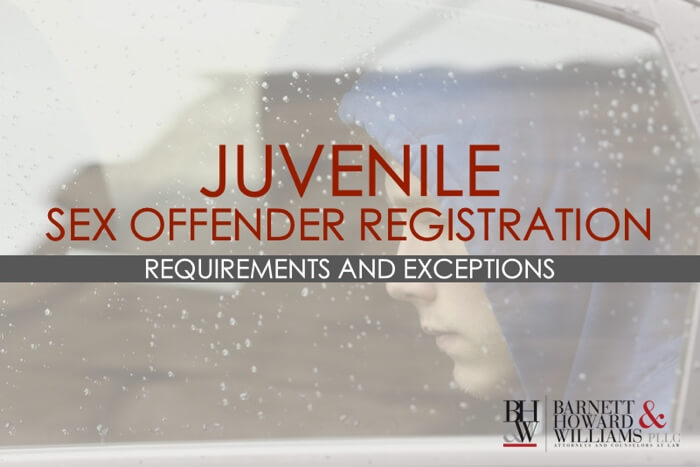
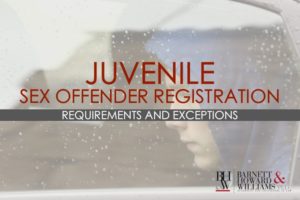 In Texas, the law governing sex offender registration contains several provisions that apply specifically to juveniles. This means that sex offender registration works differently in juvenile cases than it does in adult cases. This article will highlight how sex offender registration works in the Texas juvenile justice system and why this is an appropriate approach to take in these cases. This article will not discuss exemptions to the sex offender registration law for certain young adult offenders.
In Texas, the law governing sex offender registration contains several provisions that apply specifically to juveniles. This means that sex offender registration works differently in juvenile cases than it does in adult cases. This article will highlight how sex offender registration works in the Texas juvenile justice system and why this is an appropriate approach to take in these cases. This article will not discuss exemptions to the sex offender registration law for certain young adult offenders.





